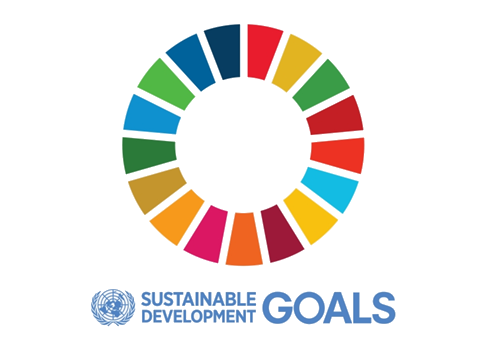EcoCampus Platinum/ISO 14001 certification
Environmental Association of Universities
 .
.
Middlesex is committed to driving positive impacts for people and planet, working to address the global challenges set out in the United Nations' (UN) 17 Sustainable Development Goals (SDGs).
In October 2021 Middlesex University signed the UN SDG Accord. Signing this Accord is our corporate commitment to deliver the Goals in the context of our institution and to inspire, celebrate and enhance the critical role that education has in delivering the SDGs.
As part of our commitment we complete an annual report that highlights some of the many inspiring ways in which we are contributing to the SDGs. The report also captures important opportunities for improvement and engagement going forward.

Middlesex in conversation
During COP28 UAE, our first global webinar explored COP28 themes and how the University and our partners on three continents are driving change globally and locally.
Watch the recording of the first webinar on Zoom
In January 2024, our second global webinar focused on Sustainable Development Goal 3: Good Health and Wellbeing.
We are proud to have achieved notably high Sustainability Development Goals (SDGs) scores in The Times Higher Education (THE) Impact Rankings 2021, which assess universities against the United Nations SDGs. Using a range of metrics, the Impact Rankings provide a complete comparison across four areas: research, stewardship, outreach and teaching. Overall, Middlesex ranked 101-200 out of 1,115 Institutions. Some key SDGs where we perform incredibly well are SDG3 Good Health and Wellbeing (ranked 101-200 out of 871 institutions) and SDG12 Responsible Consumption and Production (ranked 88 out of 503 institutions).
Since March 2020 we have maintained EcoCampus Platinum Accreditation and ISO14001 Certification, which recognise our commitment to continuously identify, evaluate and improve our environmental performance.
We became the first of 12 universities in the UK to receive a Fairtrade award under the new scheme criteria that was introduced in September 2017.
In 2020 we were one of only two universities to be awarded the highest level of Fairtrade Award – a three star Fairtrade University and College Award. To achieve the Award, universities have to meet a range of criteria in categories such as campaigning, procurement and research.

We’ve installed free water Refill machines across campus as part of our commitment to reduce plastic waste. By joining the Refill movement, we're providing our students and staff with an easy and clean way to refill their water bottles. So far we’ve saved more than 29,000 plastic bottles. Students and staff who are on campus can join Refill by downloading their app to find places that offer free drinking water.

We’ve invested heavily in our waste management service to minimise waste and maximise recycling. We dispose our waste items responsibly using our mixed recycling service, which includes the disposal of hazardous products from our labs and studios.
We are committed to our Waste Management Strategy. We collect waste on-site to reduce unnecessary vehicle movement and also have battery powered collectors that clean the campus.
Our buildings generate low carbon electricity through combined heat and power units and zero carbon electricity through solar voltaic panels. Through partnerships with The Energy Consortium (TEC) and Systemslink, our Carbon Management Plan means we have a robust energy management system in place.
We display energy certificates in all our buildings, and the Hatchcroft building, the Sheppard Library and the Grove building are BREEAM excellent rated buildings.
We collect rainwater from Sheppard Library roof, filter it and use it to flush the toilets in the building and we store harvested rainwater in tanks under MDX House to use to irrigate the planters on the terrace.
Working in partnership with TEC we are investigating ways to purchase 100% carbon free electricity and enter into a Power Purchase Agreement to directly buy green power.

We have solar panels on five of our buildings – the College building, the Hatchcroft building, the Ritterman building, the Williams building and Sheppard Library. Between April 2017 and March 2018, they generated 68,211 kWh of electricity.
On average they generate 74,000kWh of electricity every year.
We also have two combined heat and power units in the Ritterman and Grove buildings, which generate an average of 468,000kWh annually.
We are working with London Wildlife Trust to improve our Biodiversity Action Plan. Green walls and green roofs across campus, bee hives on the roof of the Grove building, a relaxed mowing schedule and refurbishment of the pond in Church Farm House Museum garden all help to enhance the biodiversity on campus. We also helped one of our students to install two hedgehog boxes on site – we are now a hedgehog friendly campus.
Our Environmental Policy sets out a framework for how we proactively manage our impact on the environment.
Here are some of the talented team who are responsible for delivering our policy.
Rabin Doolub
"I have enjoyed working in environmental sustainability with a proven track record in developing and implementing eco-friendly initiatives having gained experience on many UK national policies. I work to blend my expertise in environmental science, policy advocacy, and corporate responsibility. I am committed to driving positive change, to leverage a strategic vision to navigate the intersection of business and environmental stewardship, leaving an indelible mark on sustainable practices, above all I want to showcase the good work that Middlesex university do through our SDG accord work. Positive wellbeing of people around me is important, I am continuously self-developing, as I love learning about cultures and travelling to gain new experiences."

Nicki Littlefield
"I’m responsible for raising awareness and promoting new projects and I look after the Green Travel Plan, working with the team to help influence activities and encourage staff and students to consider more sustainable ways to live, work and travel in everyday life."
